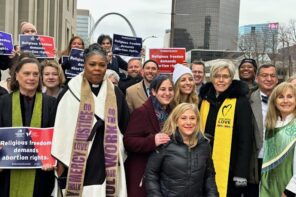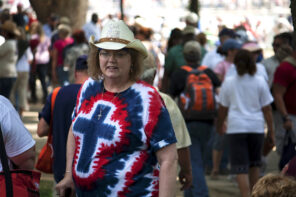Sarah does a good job covering the bases on what we know of the Democrats’ religious outreach in 2010. As she says, it’s not clear that they actually punted on faith outreach, and even if they did, it’s not why they lost, big.
Personally—and I’m just going to go out on a limb here—I think the GOP pouring hundreds of millions of dollars into a nasty, “us-versus-them” referendum on the economy may have played a role this cycle. As Christopher Hayes says, the way Democratic incumbents voted doesn’t seem to have made a difference. So why should some piddling church outreach?
It’s also worth pointing out that the DNC faith outreach program was slashed along with other outreach programs—under faith guru favorite Tim Kaine, no less. The Obama administration decided to turn away from Howard Dean’s agenda to their own, relying heavily on the Obama for America apparatus. Why they didn’t deploy OfA earlier and oftener, I couldn’t say, but if you’re looking for a lack of voter outreach to blame, that’s a good place to start.
But I want to suggest two alternative hypotheses to explain Tuesday’s results. One: age:
Those 65 and older split between the two parties in 2008 but backed Republicans by 19 points this time.
Older voters also turned out, boosting their clout in a year in which turnout was down. Two years ago, 16% of the electorate was 65 and older. This year, the age group made up about 25% of voters.
You might argue that Democrats could have done a better job appealing to young evangelicals, who are indeed much more likely than their parents or grandparents to vote for Obama. But given that the president was drawing crowds of 30,000-50,000 on college campuses throughout the fall, I’d say a safer argument is that Dems should have been using Obama’s personal charisma to appeal to the youth vote overall. Given the swing in the senior vote, it still might not have done the trick, but perhaps it would have mitigated some of the losses.
Two: the rural vote. This graphic (courtesy the Daily Yonder) sums it up pretty well:

Again, could Democrats have held some of those seats with appeals to white religious voters? Perhaps. But the more likely explanation is that these are conservative districts that would have been tough to hold in a friendly cycle, let alone one as surly as this one was.
Living as I do in one of those rural districts (my county was a prime mover in Russ Feingold’s downfall), I can tell you that nobody gave a crap about “values.” It was jobs, jobs, jobs.
If you stop to think about it geographically, the two kinds of areas that are chronically misrepresented are rural areas and poor inner cities. The money goes to suburbs and wealthier urban areas. The difference is that the folks in the inner cities know that Republicans are never going to serve their interests. The rural folks can and do swing between parties, based on who they think will give them a better deal.
And that, little children, is what it comes down to: if Democrats want to do better in election cycles, they should skip the Bible thumping and stick to offering voters a better deal than the other guys. Come to think it, it’s been tried before. How did that work out?




